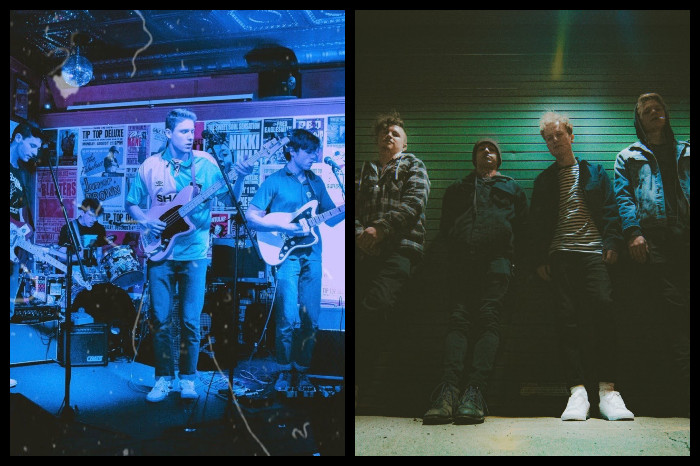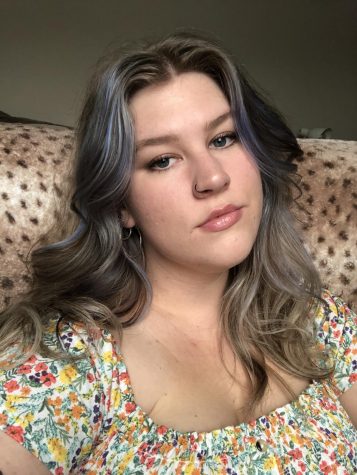Making It In Michigan
April 15, 2021
As a kid growing up in Michigan, it was difficult to ignore the dedication of the adults around me to preserve the history of our state, especially when it came to music. I was constantly reminded, “they’re from here!” anytime the likes of Bob Seger, Alice Cooper or Madonna came on the radio, and was soon relented with a tale about the cousin of a friend (of a friend) who had a band and played with them before they made it to the big leagues. Despite how long or confusing the stories may have been, from a young age I understood the depth of the union between Michigan and music. From MC5, the Stooges, to Motown, then back towards garage rock with the White Stripes in Detroit, there have been so many stages of music, it’s hard to keep up. In early March, I was fortunate enough to sit down (at a computer) with Rob Gullet, Ben DeWitt, Josh Bilisko and Matt Burdick of Pretoria, along with Trevor Sharnas of Future Misters, and speak about the current music scene taking place in Michigan.
(Pretoria shot by Olivia St. Arnold)
(Future Misters shot by Kirsten Smith)
Michigan has gone through many stages, like protopunk, Motown, garage rock and so many more. Where would you say it is now?
Josh: I think Midwest Emo is more prominent than you would think in 2020.
Rob: I think it’s getting bigger honestly, it’s a really large and growing genre.
Ben: Overall, the concept of localized music scenes and regional sounds is going away with the internet. There are still some local trends but generally it’s all starting to become merged.
Matt: Generally, it’s getting younger. In the Michigan music scene, a lot of young people are starting out.
Rob: Yeah, look at the Grand Rapids scene- there’s a lot of young bands with like, teenagers, getting started.
When further asked if the current Michigan music scene could be defined into one genre, both Pretoria and Future Misters shared the same opinion: not necessarily.
Trevor: I don’t think it’s really definable- I wouldn’t define anything as a scene or anything like that, but when you’re in the eye of the storm and out there doing it, you don’t realize those things until everyone has already done it.
Rob: I would say if anything it’s alternative, which is such a blanket term cause there are obviously subgenres.
Matt: Yeah, if I had to guess I’d say Grand Rapids is more emo and punk-leaning than the other big cities in Michigan. La Dispute and other metal-core bands came out like 10 years ago, and you can see their influence still there, but also a lot of blues-rock hangover from the White Stripes era too.
Ben: The parts of the music scene we’ve seen are still fairly small compared to the larger picture. I know there’s a lot of roots music, bluegrass and country music that we haven’t even seen ‘cause we’re in a different zone.
Are there any challenges and/or benefits to being located in Grand Rapids, MI versus anywhere else?
Ben: I think that Grand Rapids is an awesome sized city to get started in. It’s big enough to have everything there with a lot of venues and people to come to shows, but it’s not so big where your voice can get drowned out by thousands of other bands.
Josh: I second that.
Rob: Me too, a lot of bands that got started in Grand Rapids when they were younger have moved, whether it’s Detroit or somewhere else.
However, in the same sense, the bands feel that some of the challenges that occur come along with the size and location of GR.
Rob: Being from a bigger city, it is harder to stand out versus if you were from a smaller city like Holland. It’s a lot easier to say, “look there’s the band from Holland,” and know which one, which is harder to do with Grand Rapids.
Matt: It’s a classic conundrum of there’s an established big scene to become a part of, but it’s also harder to stand out.
Trevor: It’s challenging when you’re trying to go to different places to play and you kind of have to go out of your way, and we like being in Grand Rapids because we have a really loyal crowd here. Part of the challenge is trying to start there when you’re not from here. We don’t have a lot of personal relationships in Grand Rapids, so that makes it harder to get shows
Do you think that being in Michigan/the Midwest affects how you’re coming up and situate yourself in the music industry?
Trevor: I think to an extent. Whenever I tell anyone from outside of Michigan where we’re coming from, like Grand Rapids, they usually don’t know where it is. I kind of like that, but I still think ultimately where you’re from doesn’t have to affect you necessarily.
Rob: Yeah, I think so. If we were from California our music would be different, I mean we wouldn’t have to deal with shitty winters.
Matt: Or have seasonal depression.
Josh: Everything’s a lot more DIY too. All the labels and stuff are on the East coast or the West coast, so we have to do everything ourselves which a lot of bands from around here do too.
Ben: The Midwest is a pretty good spot to tour, there’s a lot of good sized cities within a few hours drive. If we were from like, Nevada (Nev-AH-da? No, Nev-A-da), touring would kinda suck.
Rob: I didn’t really think about how many major cities are near us- I mean there’s Chicago, Detroit, Indianapolis…
Matt: And we deal with winter weather, so a 2 hour drive to a place could take like 6 hours because the roads are so horrible.
Last, but not least, any Michigan artists you can recommend others to listen to?
Rob: There’s a ton, I don’t even know where to start… Future Misters, Tube Socks, Parking Lots, Ugly Flannel…
Matt: Dogleg
Ben: Hot Mulligan
Matt: Garbage Guys are also great
Trevor: There’s a girl, her name is Via Mardot, she’s really good… that’s probably the latest, other than obviously Pretoria and Vincie D who we usually play with.
Contrary to what one might assume, the Michigan music scene is alive and thriving, and as you can see—it never really left. Among our conversation of bad roads, relocation and current plans, we discussed how to support Michigan artists as they’re attempting to grow. Both bands heavily agreed that the best way to support was simple—come to shows. As the world slowly starts healing from the pandemic, buying tickets to artists’ shows not only provides income, but encourages these artists to continue pursuing their dreams.
Buy merch, stream their music, share songs on social media and spread the good word as upcoming artists attempt to make it in Michigan.
Check them out:
Pretoria
Instagram: @pretoriamusic
Future Misters
Instagram: @futuremisters


































